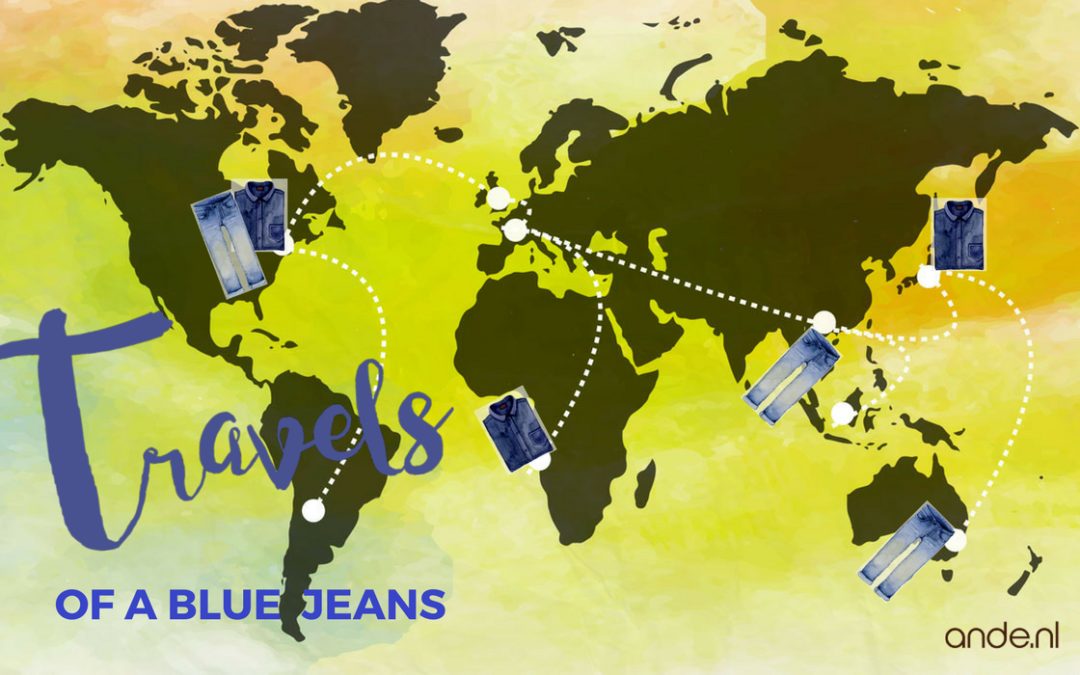The Transatlantic Travels of a Blue Jeans
Crisscrossing nine cultures before you can wear yours
“In 1853, a young tailor from Germany, called Levi Strauss, began working in San Francisco; Levi sold thick canvas to miners; the miners used the canvas to make tents. One day, a miner told Levi that he could not find trousers that were strong enough for work in the gold mines. Levi decided to make some trousers out of canvas.”
Nowadays blue jeans are seen as the “leisure wear of the world, ” and we cannot imagine life without them!
Jeans are most probably the most global product you can buy: the cotton used to produce most jeans comes from Brazil, while the blue dye comes from India. The designers are mainly European. The production of the jeans happens in Bangladesh and Indonesia. The shipping is primarily done by Chinese shipping companies which distribute them all over the world. But before the product can be distributed you need investors – which are mainly from the USA and Germany. The marketing plan might be done in the USA or Amsterdam, but the customer service is primarily carried out by sellers who are in India. You see, the jeans you are wearing have traveled literally all over the world.
And you just thought Levi Strauss jeans were of American manufacture!
Each company delivering its part of the jeans is located in a different part of the world, holding own identity and style. Their business identity will be defined by local laws, business practices, and ethics as well as the business goals and local culture and subcultures.
In this ever global world, it is unavoidable that societies, business, politics, networking, and even individuals become more globalised. Resources, people, local cultures, networking, selling, and buying are intertwined with culture and countries. Decision making and cultural norms are very much tied to each other and therefore business who want to succeed need to understand there is a difference between culture and countries.
If you want to succeed in business, you need a TCK on board
TCK’s are people who made of “understanding cultural norms” their middle name. The term TCK refers to Third Culture Kids – and while it’s not a is not a universally popular name, you do well to remember it if you want your business to thrive in the years to come.
Ruth Van Reken author of Third Culture Kids: Growing Up Among Worlds, explains: “A third culture kid is a person who has spent a significant part of his or her developmental years outside their parents’ culture. The third culture kid builds relationships to all the cultures, while not having full ownership in any. Although elements from each culture are assimilated into the third culture kid’s life experience, the sense of belonging is in relationship to others of the same background, other TCKs.”
TCK staff can support organisations like no others because:
- Cultural bridging: studies show that 64% of TCK’s have lived in an average of 3 different countries having spent at least ten years overseas. They develop the natural skills of fitting, assimilating and mingling from early age giving them an advantage when representing organisations in a diversity of situations and countries. They understand how to be the bridge when crossing cultures.
- Global mindset: Because from an early age they have learned to move from country to country, from school to school, etc., they are the ideal connectors when the diversity of people and interest are involved. They know how to explain win-win situations in such a way that people see the added value.
- They are well-suited to managing change: TCK’s are used to hear that there is a new translocation, new schools, country, friends, language, and customs. They learn from an early age to create a world where change is a natural constant element and have developed coping systems.
- Translating cultural norms: understanding cultural norms is the middle name of any TCK. From an early age, they learn to observe and follow behaviour. They are an asset for endeavours pertaining diverse groups of people as they can support communication and explain “unseen” behaviour and expectations.
- Eye for globalisation: TCK’s are brought up believing in the Global Village. They are always making links between cultures and countries. They are used to connect with people from different social levels, races, financial situations, religions, etc.
- Great networkers: Because of their upbringing, changing places often, they have learned to make, keep and manage an international network. If they do not know someone, they will have someone else in their network that will help them. They are used to connect with minorities and diverse group of people. They have a cultural diversity that unites differences.
- Great observant for manners: every culture has its manners and ways of showing education and respect. As a guest in an organisation, house or country you are expected to behave in a certain way. TCK’s, know how to behave and when they do not, they will wait and see how the host behaves. Did you know that in some countries eating with the left hand might mean you lose a very profitable deal? This is because in many Eastern countries the left hand is considered dirty. In some countries it is considered of bad taste to start talking about business in the first meeting in others is a sign of impatience.
- Efficient movers: Does your organisation need to settle in a new country? or send someone for a period of time for problem-solving? Your TCK is equipped for long and short-term assignments abroad. TCK’s are used to last minute moves as parents have been translocated many times. They are flexible, pack light and get settled faster than others.
- Business or diplomatic base: Most expats travel to assignments as diplomats or business leaders. TCK’s see from early on how international business is done but also the responsibilities, demands, and perks also how local politics play a significant role in business. This experience makes TCK highly sensitive for political and business dealings and wheelings. They know how to create win-win situations taking cultural differences into account.
Also, remember that many TCK’s speak various languages!
In summary, TCKs have skills that are important when leading a global organisation, but also have an eye for local culture making TCK’s perfect global leaders.
More about Culture and TCKs?
Wondering how networking works in different countries? http://ande.nl/networking-without-birth-network/
TCK’s are growing in numbers, and you can find them in every corner of the world. Did you know they are an asset for any manager?
When networking across cultures, you need to be aware of the local customs, norms, values and the etiquette. How to navigate the waters of intercultural networking with success?
When you network in a place which isn’t your birthplace, networking can be a challenge.How to build trust across cultures
With what I now know, I understand my struggle to be accepted and fit in.I am a TCK



 Edmée is a Professional Certified Coach (PCC) and a Certified Mentor Coach with over 15 years of broad international experience supporting coaches to prepare for ICF certifications and individuals with their personal growth. Her trademark course
Edmée is a Professional Certified Coach (PCC) and a Certified Mentor Coach with over 15 years of broad international experience supporting coaches to prepare for ICF certifications and individuals with their personal growth. Her trademark course